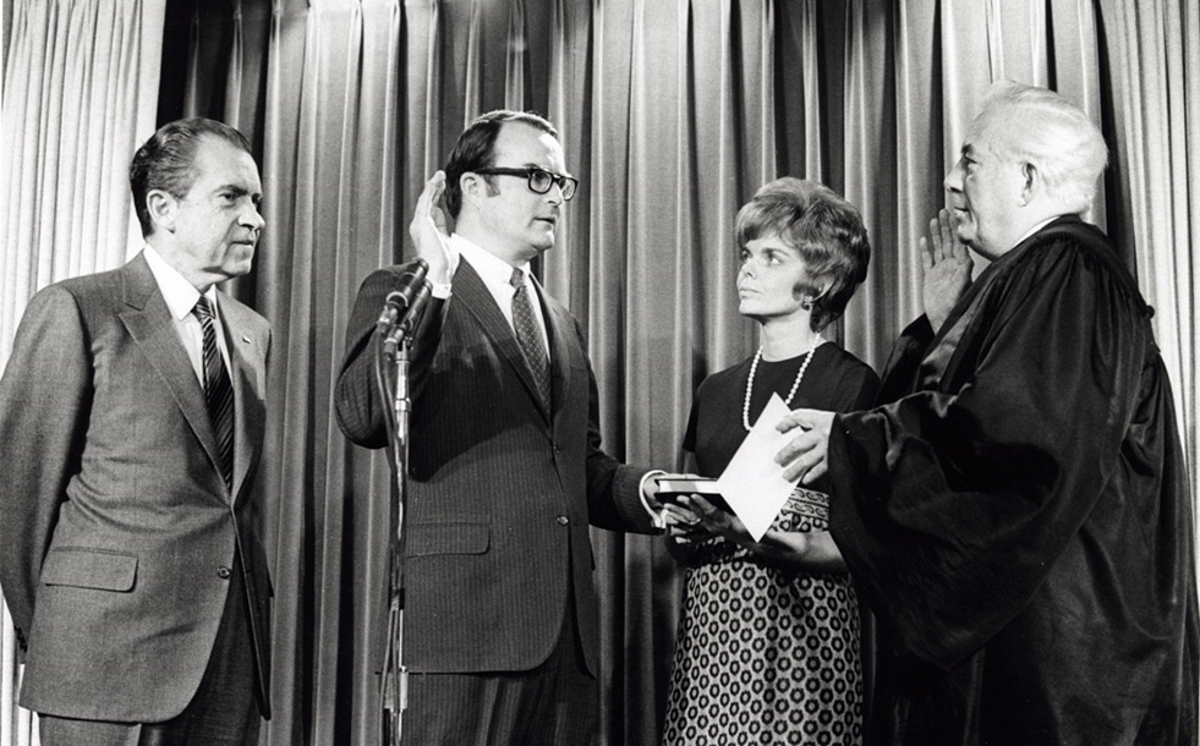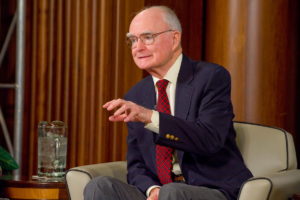
William Ruckelshaus was sworn in by Chief Justice Warren Burger in 1970 as the EPA’s first administrator. President Richard Nixon and Ruckelshaus’ wife Jill Ruckelshaus looked on.
By Bill Dawson
Texas Climate News
William Ruckelshaus, the former Environmental Protection Agency administrator who died last month at 87, lived a life resonant with historical significance.
Ruckelshaus is best remembered for his role in the constitutional crisis known as the Saturday Night Massacre in 1973. He resigned as deputy attorney general instead of following an illegal order by President Richard Nixon to fire the independent special prosecutor investigating the Watergate scandal, which ultimately led to Nixon’s own resignation.
Before and after that act of principled defiance, however, Ruckelshaus was a key shaper of U.S. environmental policy in two stints as head of the Environmental Protection Agency under Republican presidents – Nixon and Ronald Reagan.
His legacy of devising and championing federal actions to counter environmental hazards is a reminder that President Donald Trump’s basic environmental stance – scorning climate science and rolling back environmental regulations in general – doesn’t reflect the posture of all leading Republicans since the modern era of environmental concern began in the 1960s.
EPA pioneer
Ruckelshaus assisted in drafting Indiana’s first laws to combat air pollution in the early 1960s, when he was a young deputy state attorney general. He was the first EPA administrator from 1970-73, a period when landmark federal laws like the greatly expanded Clean Air Act of 1970 and Clean Water Act of 1972 were adopted. Reporting his death, the New York Times summed up the historic nature of his tenure in the EPA’s inaugural years:
[He] consolidate[d] 15 federal agencies with environmental duties into an organization with 8,800 employees and a $2.5 billion budget (about $15.6 billion in today’s money), hired new leaders, defined priorities, proposed laws and organized a national enforcement structure. He also ordered cities to curtail sewage discharges into rivers; demanded more air-pollution controls; accused paper and steel companies of water-quality violations; and banned the domestic use of DDT.
During Reagan’s first term as president, his administration pushed a deregulatory and downsizing agenda at the EPA that alarmed environmental advocates and foreshadowed later Republican attacks on the agency and the laws it administers, including Trump’s.
Reagan’s first EPA administrator, Anne Gorsuch Burford, resigned amid a scandal involving administration of the Superfund program for cleaning up toxic waste sites. Reagan appointed Ruckelshaus to succeed her and to try to restore trust in the agency.
The Times’ summary of his second service as EPA administrator:
Mr. Ruckelshaus stabilized the agency, restored professional management and subdued the scandals. But he was unable to rebuild the budget, and many E.P.A. initiatives were mired in court or stifled by Congress or business interests supported by the administration.
Ruckelshaus left the Reagan administration in 1985 to go into law and business. He was chief executive of Houston-based Browning-Ferris Industries, then a leading waste-handling company, from 1988 to 1995. During the company’s expansion into New York City under his leadership, Ruckelshaus helped prosecutors obtain indictments in a probe of Mafia involvement in garbage collection there.
Engaging with climate
Climate change was not yet a prominent issue when Ruckelshaus led the EPA in the 1970s and 1980s, but he joined the growing debate about it with a New York Times column in 2013.
In that op-ed, Ruckelshaus and three other former EPA administrators in Republican administrations – Lee Thomas (Reagan), William Reilly (George H.W. Bush) and Christine Todd Whitman (George W. Bush) – declared the U.S. “must move now on substantive steps to curb climate change.”
A carbon tax is a better way to reduce climate-disrupting pollution but congressionally unachievable, so then-President Barack Obama’s Clean Power Plan regulations to limit emissions from electricity production deserved support, they argued.
Obama awarded Ruckelshaus the Presidential Medal of Freedom in 2015, saying “he reminds us how noble public service can be. And our air and water is cleaner and our lives are brighter because of him.”
Few Republican office-holders agreed with Ruckelshaus’ and the other Republican former EPA chiefs about Obama’s Clean Power Plan, however. Trump has jettisoned its power-plant regulations, along with other climate-protection measures launched by Obama, consistent with his outspoken hostility to climate science and opposition to climate action.
In 2016, unhappy about their own party’s path on environmental issues, Republicans Ruckelshaus and Reilly jointly endorsed Democrat Hillary Clinton over Trump for president. They explained that climate change is “the singular health and environmental threat to the world today,” decried Trump’s “profound ignorance of science and of the public health issues embodied in our environmental laws,” and said Clinton was “committed to reasonable, science-based policy.”
In 1995, when Ruckelshaus headed Browning-Ferris, he granted an interview at the company’s Houston headquarters to the Houston Chronicle’s environment writer. It turned into a wide-ranging, two-hour conversation. (I was that interviewer, initially expecting to get perhaps 15 to 20 minutes of the busy CEO’s time.)
Continuing concerns
Nearly a quarter-century later, excerpts from that interview (available to subscribers or for a fee in the Chronicle’s online archives) illustrate the striking continuity of major environmental concerns and show how one key Republican conservationist of an earlier time engaged with those concerns in a broader social, political and historical context.
A note of historical context, in fact, will be helpful in reading Ruckelshaus’ comments. The interview, published April 16, 1995, took place as an intense political struggle, similar to the present moment’s, was unfolding over fundamental questions of environmental policy.
Republicans had won control of the House just a few months before and were embarking on a drive to weaken the nation’s principal environmental laws – statutes that had been enacted with bipartisan support. President Bill Clinton and his fellow Democrats in Congress were resisting the attack on the key laws, which ultimately failed.
It wasn’t just another Republican-versus-Democrat fight. The drive by House Republicans, spearheaded by Speaker Newt Gingrich and Houston-area Rep. Tom DeLay, also signaled a dramatic transition within the Republican Party itself. One of the targeted laws was the 1990 Clean Air Act, a sweeping measure that had earned many Republican votes in Congress and was proudly signed by the first President Bush, who had pushed for its passage.
Ruckelshaus said in the 1995 interview that he doubted his fellow Republicans in Congress would achieve the dramatic shift in the nation’s environmental policy direction they were seeking:
The flurry of bills in the current Congress to change environmental laws could create national “gridlock” on such issues, followed by new public fears that environmental woes are being ignored, followed by yet another “pendulum swing” to tighter regulation, he said.
“The worst things that can happen with these pendulum swings, both with the environment and the economy, is that you don’t have any kind of steady course that makes sense.”
He told me he supported the concept of “sustainable development,” fairly new to many people at the time though it had received a big boost by the first President Bush and other world leaders at the 1992 Earth Summit:
“The really big environmental problems are in the developing world,” Ruckelshaus said, and without adopting the “new paradigm” of sustainable development, humanity will have a harder job trying to avoid “far more acute environmental degradation” than has occurred.
But while developing countries critically need help, there is a growing aversion to foreign aid in the United States, “where we have a combination of affluence, technology and knowledge that can be transferred to the rest of the world in helping them achieve their development goals without wreaking havoc on the planet,” he said.
The interview was published to mark the 25th anniversary of the first Earth Day, an event credited with helping galvanize environmental concern and catalyze federal action in the early 1970s:
Ruckelshaus believes that environmental accomplishments since the first Earth Day are reason for hope, but not complacency.
“The environment is unlike building a highway or putting out a fire – you have to stay everlastingly at it or it begins to slide backward.
“But for us not to realize we have made all this progress and not to be dealing from a plateau of self-confidence and hope is a real shame, because we ought to be giving ourselves credit for the enormous progress we’ve made.”
Offsetting that optimism, however, was a warning that harmonizes with growing concerns today about the planetary character of problems like climate disruption, species extinctions and multiple threats to oceans:
[Ruckelshaus] said he fears for the very survival of “free institutions” if humanity fails to solve global difficulties related to natural resources, such as the depletion of ocean fisheries already evident in various locations.
“This is the point in history at which free institutions – nations that are concerned about freedom, whether economic or political – have their chance to show they can deal with these chronic problems.
“If we wait until the chronic becomes acute, and the free societies haven’t done enough to cope with these problems, what really gets threatened are free institutions much more than the environment,” Ruckelshaus said. “When it comes down to survival, we’ll take the steps necessary to survive, but that usually will mean some kind of authoritarian approach to these problems.”
+++++
Bill Dawson is TCN’s founding editor.

